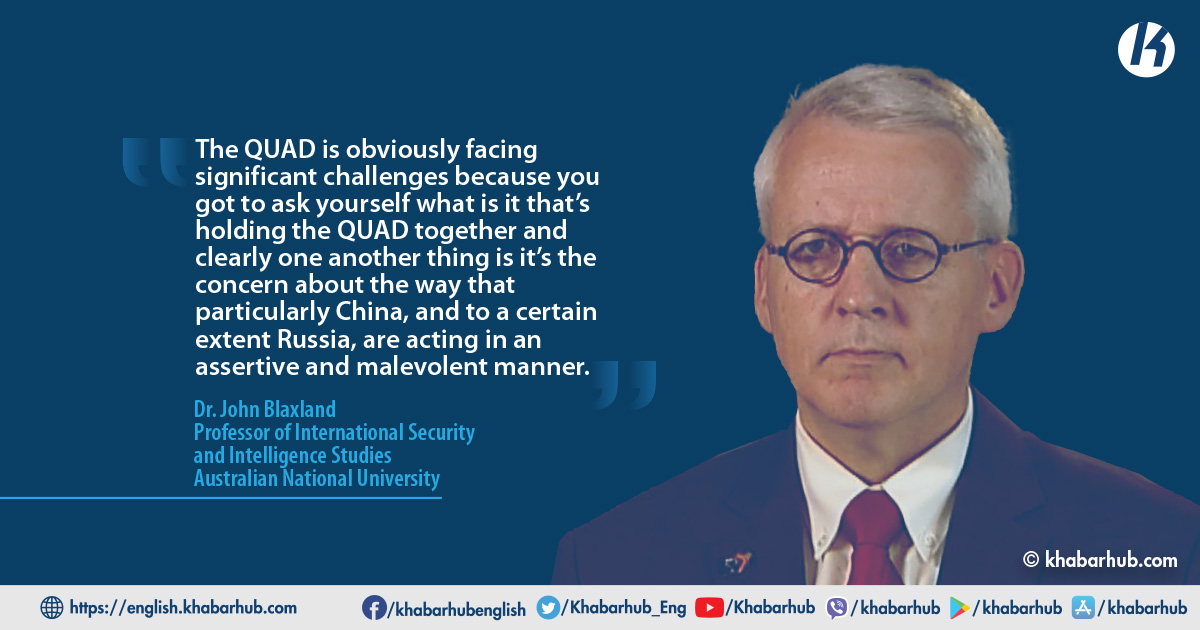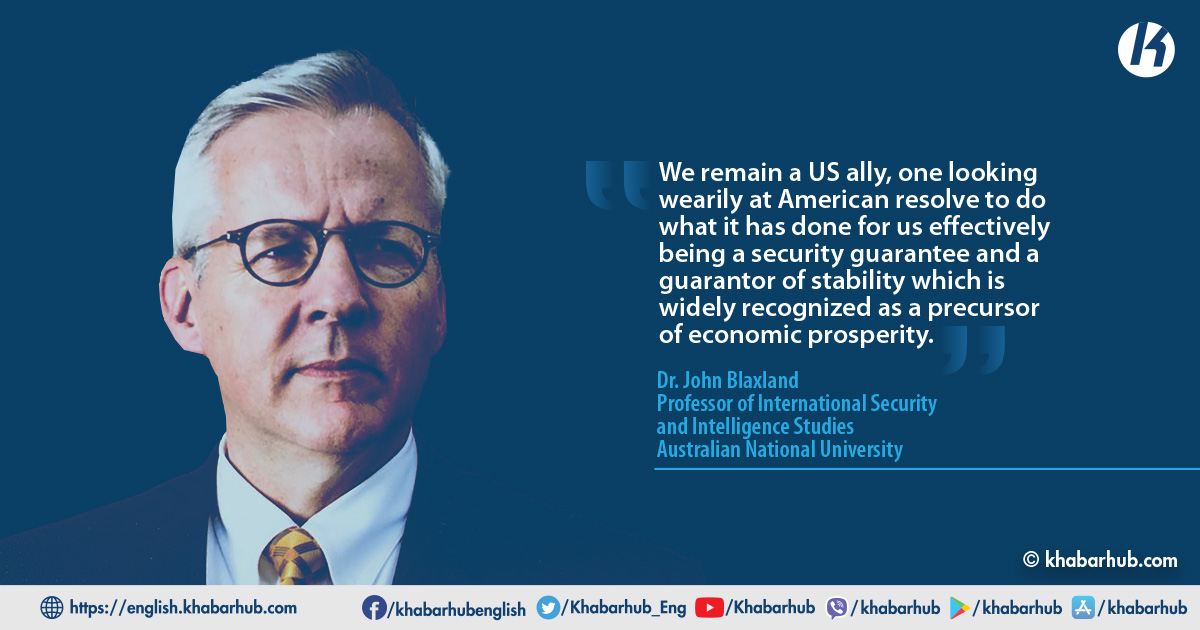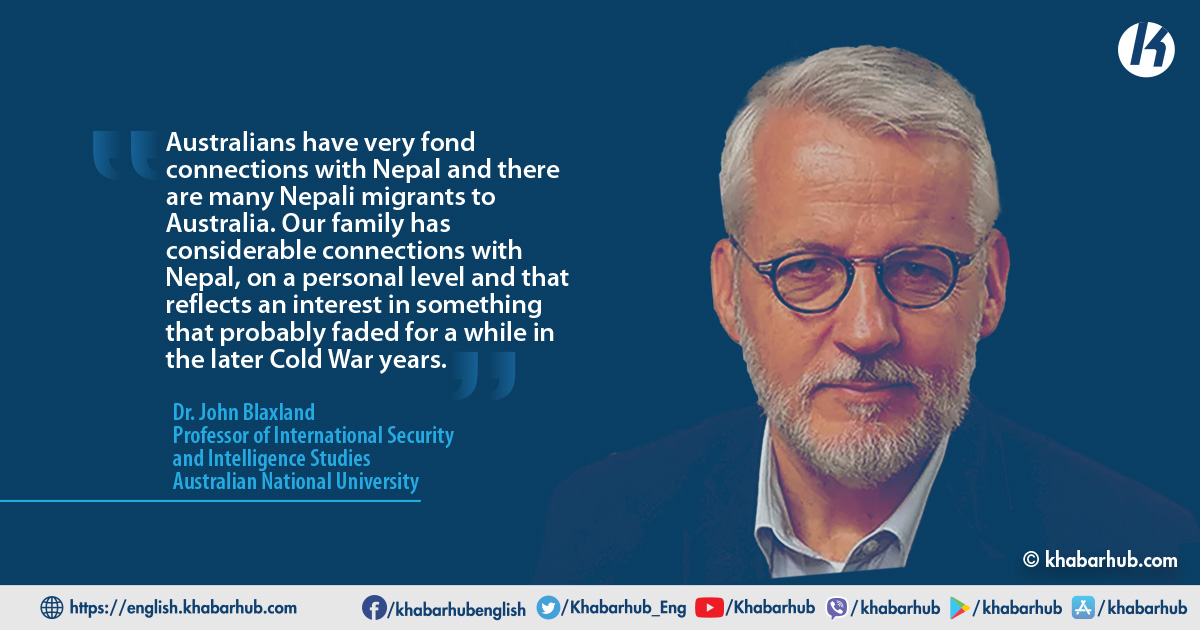Dr. John Blaxland is Professor of International Security and Intelligence Studies, Strategic and Defence Studies Centre at the Australian National University and a former military intelligence officer.
Prof. Blaxland is an expert in military history, intelligence, security and Asia-Pacific affairs. He has published several books on these issues.
He is a former Director of Joint Intelligence Operations at Headquarters Joint Operations Command and served as Australia’s Defence Attaché to Thailand and Myanmar. He holds a Ph.D. in War Studies from the Royal Military College of Canada and an MA in History from Australian National University.
Dr. Pramod Jaiswal, Strategic Affairs Editor at Khabarhub, spoke to Prof. John Blaxland on Australia’s role in Indo-Pacific, Australia-China Relations and its relations with South Asia in general and Nepal in particular.
What is Australia’s defense agenda in the contested Indo Pacific? How is it different or similar to any other conventional alliance?
Great question on Australia’s defense agenda. It is an interesting one because we have been a treaty ally of the United States since 1951 and that has been a key pillar to Australia’s security outlook for the last seventy years.
In fact, going back earlier to the second world war but 1951, was when that was formalized and what we have seen is for the last 30 yrs until recently with the end of the cold war.
The American unipolar moment meant that we felt fairly comfortable that we did not have to do too much of our own heavy lifting in terms of high-power development and applicational force anywhere in the world.
So, we happily contributed to UN peacekeeping missions in the 1990s. Then when things started to heat up in our neighborhood, we contributed forces to resolve a situation in Bougainville, East Timor and the Solomon Islands in the pacific.
Then when things happened in Washington and New York on 9/11 twenty years ago, Australia contributed to US-led missions in Afghanistan and then subsequently in Iraq.
Now, what we haven’t quite appreciated was what a catastrophe they would be and how much they would actually shape American resolve, power and resources at a time when China was rising in the great power equation across the Eurasian landmass and beyond was altering dramatically in a way that pundits have not quite appreciated.
So, we face a world today, where particularly since the global financial crisis in 2007-08, where China’s rise did really seem to be accelerated and America’s power seems to be eclipsed if not overtaken, but what we have seen from the Australian point of view is a kind of a shift we have started to see the world differently.
Not that we want the alliance to fade but we realized this shift particularly in the last 5 years or so with America’s challenges domestically or politically with the “Make America Great Again” and “America First” phenomenon of the Trump administration.
Similarly, the apparent American uncertainty about its posture in places like Afghanistan and elsewhere has led Australia to think more about having to do its own heavy lifting and invest more in its own neighborhood.
This being complemented by the challenges of environmental concerns and looming environmental catastrophe and spectrum of other governance challenges such as terrorism, people smuggling, drug smuggling and the breakdown of law and order, particularly in some of the small states in the pacific islands and Southeast Asia.
Thus, the combination of all these factors has seen Australia trying to place much greater emphasis on what I call ‘Australia’s Foreign Policy Plan B.’
The Foreign Policy White Paper of 2017 articulated the plan to invest more heavily in its relation in South-East Asia in the pacific and then beyond that across the Indo-Pacific in South Asia and East Asia and beyond. It was a positive plan.
The government, however, has found it difficult to follow up on that plan and stick to it. Nonetheless, broadly speaking the direction of that plan is a constructive one. So that’s where we stand.
We remain a US ally, one looking wearily at American resolve to do what it has done for us effectively being a security guarantee and a guarantor of stability which is widely recognized as a precursor of economic prosperity.
So, as we look to maintain our economic prosperity, we are looking to reach out for connections around the region and beyond, mindful of that in this day and age our own economic prosperity is more linked more interlinked with our neighbors than ever before with global trade connections and interdependencies making Australia a more international-minded country than probably has ever been.

When it comes to QUAD, how parallel are the US, Australia, Japan and India’s aspirations and goals?
It’s an interesting proposition. It started at the talkfest and it gained a bit of momentum clearly with a security dimension prominent that has economic, political and social dimensions.
The QUAD though has its detractors, many in Southeast Asia, for instance in the association with Southeast Asian Nations or ASEAN are nervous about what the QUAD might mean for them.
They are worried about the centrality of ASEAN being undermined and they are worried about great power contestation being fought in their own backyard in the Southeast Asian region.
The QUAD is obviously facing significant challenges because you got to ask yourself what is it that’s holding the QUAD together and clearly one another thing is it’s the concern about the way that particularly China, and to a certain extent Russia, are acting in an assertive and malevolent manner.
These are driving the four countries to work together. Japan, Australia, long-standing US allies have been nervous about American resolve and also eager to engage India as a potential great power ally in a balancing act as China’s rise has increasingly threatened and cajoled Japan and Australia.
Both of the countries have been recipients of significant assertive and aggressive Chinese action aimed at drawing their response of backing down and agreeing to Chinese demands.
Now both Japan and Australia have resisted those demands. Japan obviously being much closer to China than Australia, feeling much more acutely the need for a great power partner across the Eurasian landmass, a country like India has been part of that.
So, Japan has reached out and made significant efforts towards India to make the QUAD work. Australia originally was invited to join the QUAD back in 2007, we originally backed out in an attempt to placate China, but as it turned out that attempt to placate them was relatively ineffective and arguably futile.
Subsequently, we have seen a reinvigoration of the rationale for joining the QUAD to give Australia greater leverage, connectivity with India and the great Indian ocean interoperability.
Mindful that China is very much an Indian Ocean player as well and that if Australia wants to be able to exercise some leverage, it needs to do so alongside India.
So, they’re very interesting dynamics at work, but my concern is that while the security dimension of the QUAD is growing between them, there is a real need for other dimensions.
I have written about this in a piece in the East Asia Forum with my colleague Dr. Ashok Sharma about the need for the QUAD to be an instrumentality that includes economic dimensions and that is mindful of the environmental concerns of the Indo-Pacific region.
Similarly, there’s some scope for growth in the QUAD with its limitations. Each of the four countries has different reasons and priorities, but they at the moment have sufficiently overlapping national interests driving them to cooperate more effectively together.
The great irony is that China’s attempts of trying to break the four countries off have instead driven them closer together. China’s action in the Himalayas on the line of actual control appears to have driven considerable reaction in India.
Similarly, their action around Senkaku or Deyau Island in the East China sea has generated fairly strong action in Japan. As has the kind of ‘Wolf Warrior Diplomacy’ in the exercise of Chinese sharp power against Australian trade and rhetoric against Australia generated quite a strong reaction in Australia against China.
The lack of goodwill towards China is palpable in these countries now and the great irony is that China’s soft power is not that strong despite its economic power. QUAD exists because of the surprising resurgence of Chinese belligerence.
With the rise of ‘militarism’ as a preferred format for states to meet the challenge of great power competition, how might diplomacy evolve to match the shifting security landscape of the coming decade? How effective is ‘minilateralism’ as a tool to deal with the rising hybrid threats and grey zone?
Minilateralism seems to be very much in vogue in part because some of the bigger institutions have got a bit of political gridlock.
The United Nations for instance with the veto power of the UN security council members the ‘permanent five’, it’s always on one side or the other objecting to something and refusing to allow the UN to make progress on the issue.
Similarly, with the Association South East Asian Nations (ASEAN), which is an organization in which many had considerable hope for the future.
It is an organization essentially also experiencing a degree of gridlock because of the requirement to operate with the nimiety for all 10 countries’ member states to agree.
And of course, at the moment experiencing considerable pressure particularly from China but conversely from the United States as well to take a position to their own comfort.
This means that in the absence of those kinds of bodies bring out to exercise the power and the authority that people had hoped that might be able to generate, we see minilateral measures like the QUAD emerging as the kind of go-to mechanism that’s a viable alternative in the short to medium term as a way of addressing these concerns.
You touch on grey zone operation not much of that is about seeking to achieve political effects without declaring war and physically firing guns and missiles at each other.
This is getting tricky. We have seen this in the South China Sea through getting de facto control of the South China Sea coupled with aggressive rhetoric coming out from Beijing and trade sanctions and attempts to manipulate through foreign interference directly or indirectly.
But also now with increasing cyber-attacks, our society has now become ‘web enabled’ to web dependent as a result becoming web vulnerable.
These web vulnerable societies like ours that can be reached out from far through the internet and can be manipulated and these concerns are driving huge problems for national institutions and industries.
Australia has become a subject to cyber attacks many times, my own institute has been subject to cyber-attacks.
Similarly, the banking industry, parliaments, television networks have been almost closed down by cyber-attack.
These aggressive actions are driving a concern that we need to change the way we respond and work collectively to push back and resist these kinds of offensive grey zone operations.

What hopes does Australia have for the forthcoming first in-person QUAD summit expected to be held this fall in Washington DC? What areas will Australia be looking forward to discussing during the meet?
I don’t have complete clarity and visibility about the agenda directly. Reading the environment, circumstances and the issues that are bubbling away at the moment, there is clearly a concern about what’s happening with the response to the pandemic (COVID-19) seems to be a real challenge for all four QUAD countries and it’s the challenge to the world.
The QUAD countries are actually the ones who are well resourced to address these challenges if they can get their own house in order. Now, we know India has been suffering from the pandemic from the 4th wave (delta wave).
Australia too; I am operating from home partly because of the lockdown in Canberra where I am because of the outbreak of the pandemic (Delta variant) in Canberra. So, these are issues that are local but they are also regional and global.
And QUAD has to respond to those in addition to the challenges that we have talked about; cyberattacks, maritime militia, the assertiveness of China in ‘Wolf Warrior Diplomacy’ and exercise of sharp power through trade sanctions.
It’s really important for these countries to work to coordinate their message if they want to be effective and they do.
They need to work in coordination. So, there is a broad range of issues; pandemic related, environment-related, great power contest related, use of the maritime militia and how do you respond to that, cyber-attacks and how do you respond to that. The agenda is growing.
What we are seeing is India becoming more and more included in the fold of networks that are interoperable in nature of the relationship between Japan, Australia and the United States and ones who are allied with the United States and not directly with Australia and Japan.
There is a level of interoperability within our systems, our protocols, procedures and our networks that has not included India that much and I suspect we can see the rise in the coming months and that is probably going to be on the agenda as well.
How do we bridge interoperability, and for Australia, particularly in maritime space, operating in a more interoperable way with India, with the Indian navy and the Airforce in and through the Indian ocean territory that we share.
In India’s case, Andaman and Nicobar, and in Australia’s case, Cocos and Christmas and how we operate in that northeastern corner of the Indian ocean. Lots of issues are to discuss.
My concern is that they really need to grapple more with the environmental ones, pandemics being the most prominent at the moment.
But the environmental ones- the felt needs, the needs that are articulated by the groups like Pacific Island Forum, the countries of the Pacific that are subject to significant influence and great power contestation are alive and well in the Pacific, particularly in the south pacific at the moment.
So, responding to those felt needs is a really critical one for all the QUAD countries to rise and respond to it appropriately.
India has a connection with the Pacific particularly through the diaspora in Fiji but elsewhere as well. Japan has invested in this space.
Australia has tended to see into its backyard particularly alongside New Zealand, its traditional partner in South Pacific working closely with Papua New Guinea, Solomon Islands, Fiji and other island nations in the Pacific is going to be really important.
The US has launched a large-scale, all-domain military exercise in the Indo-Pacific region with Britain, Australia and Japan which also coincides with Chinese military training drills in parts of the South China Sea.
According to you, what signal are the US and participating countries trying to convey to their adversaries including China, since the exercise is also the first of its kind in more than four decades?
It’s very interesting to see the involvement of countries that had not played a prominent role in East Asian affairs or Indo pacific affairs for a long time.
Here I’m thinking about Britain, France, the Netherlands, Germany even. These are all countries that once upon a time had considerable colonial footprints in this part of the world obviously, but haven’t for a long time, we’re talking about half a century ago.
So, this is not something that’s a resurgence of that really, with the exception obviously being France in its Pacific island territories.
But it’s interesting to think about where things are going, these are countries that are actively pursuing engagement with the United States, alongside the United States and Japan, Australia and India as well, in pushing back and basically sending a signal to China that “You may well be at the other end of the Eurasian landmass to the people in Europe, but we’re not happy with what you’re doing and we’re conscious that in this world where we are all connected actions at your end, the Eastern end of the Eurasian landmass effect ours as well”.
And there’s also a recognition amongst these European powers that it’s in their interests to ensure that the United States remains active and engaged on these issues.
Let’s look, for instance, at Britain with the deployment of the Queen Elizabeth aircraft carrier.
Now, there’s a range of motives behind it, one is they want to show off the aircraft carrier, they’ve just had Brexit and they’re trying to re-establish foreign policy that includes all the commonwealth countries and countries that they’ve had connections in the past that they’ve let atrophy and lapsed to a certain extent and are now trying to reinvigorate those relationships.
But at the same time, they’re also looking for trade opportunities, wanting to show off British martial prowess and their equipment. They also want to get back a little bit at China because of what they’ve been doing in Hong Kong and how the treaty that was signed in 1997, has been essentially abrogated by China.
They also want to build up relations with Japan and bolster their ties with the five power Defence Arrangement – One of the minilaterals we talked about.
Five power Defence arrangements are really interesting arrangements actually. It includes these former British Empire countries, Malaysia, Singapore, Australia, New Zealand, and of course the UK.
And it’s interesting how these five countries find it really useful to keep it going. Now, this is an organization that’s now 50 years old this year. It was formed in 1971.
The five power Defence Arrangement or FPDA on one level seems a bit of an anachronism, and on another, it’s got a vitality that is remarkably youthful and it appears to have considerable resilience.
So even today, for instance, Indonesia, which was once seen on adversarial terms, is now invited and has observer status as liaison officers for FPDA events.
So, we’re seeing a change in the dynamics. It will be interesting to see how China responds to this, whether they have a degree of humility in response or they push back and I suspect they will push back.
But I think in pushing back, they may well want to be mindful that they are more dependent on other countries and vulnerable to the wishes of other countries than they perhaps would have liked.
It’s interesting to think about the trade situation for instance with Australia. We had a swag of sanctions imposed on Australia over beef, wheat, barley, wine, coal, etc and yet Australian trade with China has actually grown.
The other thing is that there is a view, it appears in China, that President Xi can exercise power a bit like the command economy of the past, but the global economy is not a command economy.
There are ebbs and flows, trade waxes and wanes, economies do go through booms and busts and there’s supply and demand, and China doesn’t own those variables. It doesn’t control them. It certainly can influence them but not control them.
Thus Australia, like many other countries now is seriously questioning the wisdom of further investing in the bilateral relationship and looking to diversify.
That’s why it’s so interesting with all these minilaterals, they are all efforts to diversify, to get away from over-dependence, over-reliance on the bilateral relationship with China, mindful that they are now using that as a bit of a tool against us like a stick against us and we therefore in order to mitigate the risks of that are looking to diversify.
That’s easier said than done because once upon a time it was easy for Australians, in particular, to get a team and go to China and do a series of deals, go back to Australia and pat each other on the back.
Now, it’s much more difficult, free trade agreements are in place with Indonesia, India and other countries in Southeast Asia like Japan, Korea, etc, as capitalizing upon them is just a little bit more challenging.
And that’s where the future lies, engaging in that space in more multilateral, bilateral and more minilateral ways.
It’s been a year since China started ramping up its campaign of trade punishment against Australia. What lessons can countries learn from Canberra’s experience about how to manage their relations with Beijing? Also, in terms of ‘having Australia’s back’ what kind of support is being offered by its allies and the US as a collective pushback?
The thing we need to realize is that China likes to single out individual countries for punishment. It’s done the same to Korea, Norway, Sweden, Canada, Japan and Australia.
However, we’re not being singled out, we are all essentially in the same position and i.e. facing the challenge of assertive and surprisingly arrogant China.
China sees its role as basically demanding subservience from states that don’t see it in their interests to be subservient to China.
And, there’s a degree of miscalculation here on President Xi’s part, about the way the international order works and this may well come back to haunt him.
There are alternatives to this and what we’re seeing is that countries like Australia and others in the region want to see what they can do about diversification and finding other markets to mitigate the risk of being overly dependent on the Chinese market.
Of course, the key countries most exposed in this front are actually two of the QUAD countries: Japan and the United States.
The United States, which was instrumental in allowing China to join the World Trade Organization two decades ago has subsequently invested enormously in China, with industrial plants from Google, Apple, Boeing among others.
The major core American corporations are heavily invested in China and to a certain extent subject to a bit of manipulation by Chinese authorities to exploit and capitalize on the opportunities.
In the light of this, there’s a reassessment and realignment taking place in the United States, much as there is in Australia and Japan and elsewhere. So, small countries with limited freedom of action, and leverage, i.e. countries like Nepal, New Zealand are, however, also not wanting to be completely beholding one or the other power and looking to hedge their bets and provide some space for them as a political entity to survive and thrive without being completely subsumed. So, there are challenges ahead for all of us.
Being a former Australian Army officer and a war historian, how do you assess the evolution of Australia’s Defence Strategy over the years? What are Australia’s current Strategic Policy challenges and opportunities?
There’s a book by an Australian leading figure, thinker and writer called Allan Gyngell and the book is called “Fear of Abandonment”.
It is a really telling title for a book because it speaks to Australia’s predicament, a kind of the western European transplanted community on the edge of Asia that over the last 50 or so years, since we got away from the white Australia policy, has become actually quite a Multicultural, inclusive and diverse society and more engaged with Asia than ever before. But at the same time, its sense of identity remains largely Western.
Our institutions, the common laws, British derived legal system, the bicameral federal parliamentary model, are also British derived but essentially modeled on the European models of governance in a society.
There are echoes of it throughout the world. Ironic is the case of China, a communist country. Where does communism come from? Karl Marx and Lenin, are European models.
So, I find it ironic that China is asserting itself on the back of a Jewish German migrant to the UK, who is very successful in selling the book Das Kapital.
We live in a world today that is more interconnected, less uni-cultural, less distinctive, less separate than ever before and we are more connected than we’ve ever been. Australia for instance has over 4 percent of its population today from South Asia, another 4 percent from Southeast Asia and another 4 to 5 percent from Northeast Asia.
That’s in addition to the migrants from Europe, Africa and Latin America. There is still a concern about the idea of the fear of abandonment, but we’re also seeing that our place in the world is much more interconnected and much more dependent in a codependent way with our neighbors in the Indo-pacific.
That makes for very interesting times ahead, interesting security, and economic and political challenges that we all share and how we respond to the pandemic is illustrative of that. Australia’s engagement in trying to help out in the Pacific by sending vaccines to Papua New Guinea, Fiji, Solomon Islands, Indonesia and collaborating with India and Japan and the US on trying to facilitate additional supplies around the world. This is the new normal.
Australia has recently disclosed plans to use USD581 million, elevating its military bases and growing joint exercises with the United States, amidst the risk of a confrontation with China. According to you, how different and significant is this decision?
It is significant. It shows a recognition that Australia needs to put its money where its mouth is. Australia has been doing quite the opposite of the axiom from Teddy Roosevelt, the US president from the beginning of the 19th to the 20th century.
He said “We speak softly but carry a big stick”, in Australia’s case, we’ve been speaking a bit loudly and carrying a small stick. So, there’s a recognition in Australia that if we want to be more assertive in terms of our values and our interests we need to double down on capabilities to back that up. The stick needs to be a bit larger.
That means we’ve got to invest in capabilities if we want to deter aggression and we actually need to be credible in what you have on offer to conduct that deterrence.
Our military capability, while it is very useful for helping the pandemic, floods, fires, tsunamis and crises in the Pacific and the Indian Ocean, it is essentially an insurance policy against the prospect of War.
We all know that and every country does that and for it to be a credible insurance policy it needs to be reasonably robust as it can’t just be something that is an easy pushover.
In Australia’s case, what we have in our Defense Force today is a Defense Force designed for the unipolar moment.
The days immediately after the Cold War ended, when Francis Fukuyama talked about the end of History, democracy had won and the United States was the top dog, we didn’t have to spend that much on our own defense anymore.
That moment has passed and there is a growing realization that the dynamics are perhaps more akin to those of the 19th century, where there was considerable great power contestation and needing to be more mindful of the Machiavellian nature of international politics.
And I guess it speaks to a degree of disappointment about the United Nations and other mechanisms like that because of the limited power of those institutions when they are subject to the veto power of the great powers. And that’s the world we live in today.
Apart from India, how do you look at Australia’s engagement in South Asia in general and Nepal in particular?
Australians have very fond connections with Nepal and there are many Nepali migrants to Australia. Our family has considerable connections with Nepal, on a personal level and that reflects an interest in something that probably faded for a while in the later Cold War years.
When you think about the way the British Empire unraveled, Australia tended to retreat back from its connections across the Indian Ocean to the older parts of the British Empire that we had previously been connected to quite well. We’re seeing a resurgence in that.
We’re seeing India clearly becoming much more prominent in Australia’s strategic calculus in our diplomatic footprint, in our trade endeavors with considerable trade initiatives, in that space now.
Similarly, with Bangladesh, Nepal and Bhutan as well, there’s an interest in engaging closely because there’s a recognition that we’re actually all in the same kind of boat and the same circumstances.
But essentially, we’re seeing a re-emergence of the significance of Nepal, amongst the South Asian states to Australia’s engagement with the Indo-Pacific more broadly. You may see a resurgence in interest and that goes beyond the warmth of affection and affinity between Australia and Nepal, that is about the connection with the Himalayas.
The adventure of Australians going to Nepal. My wife has been but I have not, we’ve talked about going together in the future, it is an anecdotal perspective to be fair.
But there’s a warmth towards Nepal from Australia and many other places in the world that is ripe for deepening and broadening, and we’re on the cusp of that.









Comment